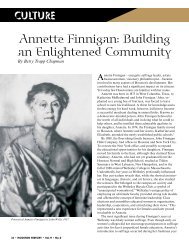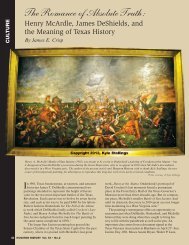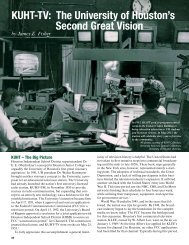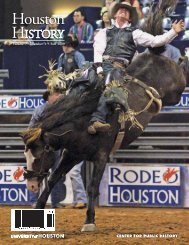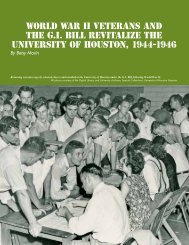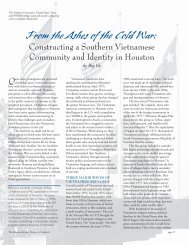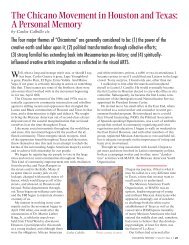Coach Tellez giving pointers to Patsy Walker, a national champion inthe collegiate heptathalon.Tom Tellez observes the competition with triple jumperMichelle Newman at a track meet.and the 400 x 100 meter relay. Although they failed to meet thatobjective, they learned an important lesson that impacted theirfuture approach.The Olympic rules for the long jump allow each athlete sixattempts at getting his or her longest jump. That many attempts,however, tax the body’s endurance and stamina. Carl took allsix of his allotted jumps, but the effort left him so spent that thenext day he lost the 200 meter and the chance to take home fourgolds in the World Games. Obviously, the strategy for the 1984Olympics had to change. They ultimately settled upon a gutsystrategy that would take peak performance and concentration.Tellez decided that Lewis would practice the long jump so thatthe first attempt would be the winning jump, allowing him toforego his remaining jumps. When the 1984 Olympics arrived,Lewis won the 100 meter and then faced the long jump. As decided,Carl made only one jump in the event that day. The fansbooed him, but as Tellez says, “It was my call, my decision, notCarl’s. I wanted him rested for the 200 meter race the followingday.” As it turned out, the strategy worked, and Lewis achievedhis dream of matching Jessie Owens’ record. 18Tellez also coached several women athletes in NCAAcompetitions who left their marks as champions: Jolanda Jones,Carol Lewis (Carl’s sister), Jackie Washington, and MichelleCollins. The difference between coaching women and men wasobviously not an area easily discussed or explained by CoachTellez. Picking his words carefully and pausing frequently, hestated that coaching women is “basically” the same as coachingmen but pointed out that, “They are focused, they are reallyfocused. Women can do amazing things—they can do everythingthe guys can, but, you know—they are—I think—a coachhas to have certain skills to really coach women.” Without anyelucidation or interpretation of what constitutes those “certainskills,” Tellez continued, in a tone that suggested he felt hewas walking on egg shells, “I coached them like I coached theguys, I just coached them—I may have raised my voice a littlebit and maybe got on them a little bit like I would a guy. A guy18 Vol. 6, No. 3–Sportswould never think two seconds about the way I raised my voicebut a girl may. She may interpret that as being mad at her ornot—or whatever.” In the movie A League of Their Own TomHanks made it clear there was no crying in baseball; Tom Tellezsuggested that there was no crying in track either. “Maybe,” henoted ruefully, “I’m not skilled in coaching women, I’d rathercoach men. I think there is a knack to doing that . . . to gettingthe most out of women.” 19 With that, the issue of coachingwomen ended. The record, on the other hand, suggests that hedid know how to coach women. According to his profile on theOfficial Site of The University of <strong>Houston</strong> Athletics online:[Tellez] began the Lady Cougar program and led them tothree Top 10 finishes at the NCAA Indoor Championshipsand eight Top 20 finishes at the NCAA Outdoor meet.<strong>Houston</strong> also won the 1983, 1984 and 1987 SWC indoortitles and the 1984 and 1990 SWC outdoor championshipsunder his direction. 20Tellez’s coaching skills became widely appreciated internationally,and he received invitations from several countries tohold clinics and train their athletes. Conversely, many foreignathletes traveled to <strong>Houston</strong> in order to train with him. He madeit clear, however, that he did not recruit heavily among foreignathletes:Though we have had foreign athletes, I didn’t go out andactively recruit them, first because we did not have themoney, and secondly, I felt I wanted to give whateverscholarships we had to Americans. I wanted to developAmerican athletes in college because developing athletesis where I get my greatest satisfaction. However, foreignathletes spoil you because they are so good, they are very“coachable,” they listen, and you never have to worryabout their grades. 21After twenty-two years as track and field coach at UH, Tellezfelt he needed a change. Kay had passed away, and her deathhad a profound effect on him, as did demands for paper work
Tom Tellez applied his techniques to help athletes that other coachesmight have written off before they ever got started.Santa Cruz. His daughter attended the University of Texas,where she majored in chemical engineering before earning herM.B.A. at Southern Methodist University. His youngest son followedin his father’s footsteps, working as associate head coachin track and field at the University of <strong>Houston</strong> under LeRoyBurrell, one of his father’s Olympians.Probably no other college or university in the nation hasan on-campus sport center named after a coach and his starstudent. In light of Tellez’s and Lewis’ stunning accomplishments,the University of <strong>Houston</strong> honored the pair by namingthe new athletic center after them: the Tom Tellez Track at theCarl Lewis International Complex. A glass encased room to theright just inside the foyer houses the University of <strong>Houston</strong>’sHall of Fame. One cannot escape the air of spiritual-like nostalgiawhere a visitor can capture the shared giddiness of victory,recalling memories of incredible athletic feats. An impressivebronze statute of Carl Lewis dominates the space, while hiscoach of sixteen years, Tom Tellez, stands in the wings with theinsistent message of discipline and perseverance – an echo thatemerges from antiquity.Sometime between 54 and 55 A.D., the Apostle Paul wrotea letter to the Corinthian congregation in hopes of raising theirmorale to do bigger and better works. To make his point, heused the metaphor of a competitive foot race. In that letter,preserved as 1 Corinthians verse 9:24, Paul wrote: “Don’t youknow that those who run in a race all run but [only] one receivesthe prize? Run like that, that you may win.” 23and the advancement of technology. Ironically, new technologyoffers athletes instruction from Tellez on YouTube, where theviewer can access videos of some of his clinics and track meets,including the Olympics, showing many of his student-athletescompeting. Tellez has received an extensive list of honors andaccolades, with some writersdeclaring him the greatesttrack coach ever. Tellez, however,claims that receiving the1990 Hispanic Heritage AwardHonoree for Sports stands, inhis words, as his most cherishedaward. 22The relationship betweenTellez and Lewis remainsclose. Tellez continues to coachindividuals including athletesthat Lewis, now living in NewJersey, sends to him in aneffort to help them developtheir talent. In addition, sportsfederations from differentcountries also send youngstersto Tellez to coach.Tellez now directs his abidinglove of animals towardsa pair of Arabian horses hekeeps on his acreage north of<strong>Houston</strong>. His oldest son has aPh.D. in education and teachesMexican-American studiesat the University of CaliforniaErnesto Valdés has a B.A. from Trinity University, a J.D.from South Texas College of Law, an M.A. in Public <strong>History</strong>.He serves as Director for the Oral <strong>History</strong> Project in theCenter for Public <strong>History</strong> at the University of <strong>Houston</strong>.Tom Tellez was joined by his wife, Kay, and brother, Don, in Washington, DC when he received the 1990Hispanic Heritage Award for Sports.Photo courtesy of Tom Tellez.Vol. 6, No. 3–Sports 19
- Page 1 and 2: Volume 6 • Number 3 • Summer 20
- Page 3: table of contentsReaders’ Forum P
- Page 6 and 7: A Conversation with...MR. ASTRO, LA
- Page 8 and 9: young player, you know, to try to m
- Page 10 and 11: Astros owners R. E. “Bob” Smith
- Page 12 and 13: all the time. And then, I spent my
- Page 14 and 15: LD: Yes, I did. Sportsman’s Park
- Page 16 and 17: By Ernesto ValdésTrying to instill
- Page 18 and 19: ecause I wasn’t very old and . .
- Page 22 and 23: Rain or Shine:How HoustonDeveloped
- Page 24 and 25: since the St. Louis Cardinals owned
- Page 26 and 27: City on the international map.Peopl
- Page 28 and 29: Hofheinz worked with Monsanto to in
- Page 30 and 31: Story Sloane’s GalleryHermann Par
- Page 32 and 33: THE FIRST PROMISING RUMOUR I heard
- Page 34 and 35: Never one to hold back, an animated
- Page 36 and 37: Babe Didrikson Zaharias demonstrate
- Page 38 and 39: Babe sets up a putt at the Babe Did
- Page 40 and 41: 38 Vol. 6, No. 3-Sports
- Page 42 and 43: Today, multilingual signage of busi
- Page 44 and 45: A large crowd gathered for the much
- Page 46 and 47: The neighborhood welcome sign indic
- Page 48 and 49: preservation CAN work in houston:Th
- Page 50 and 51: of falling to the wrecking ball, as
- Page 52 and 53: SpawGlass Construction managed the
- Page 54 and 55: “KUHF’s ‘Texas Originals’ w
- Page 56 and 57: 24 Ibid; Richard Dean, “BASEBALL
- Page 58 and 59: 6 “Houston Deco: Modernistic Arch
- Page 60: University of HoustonCenter for Pub




